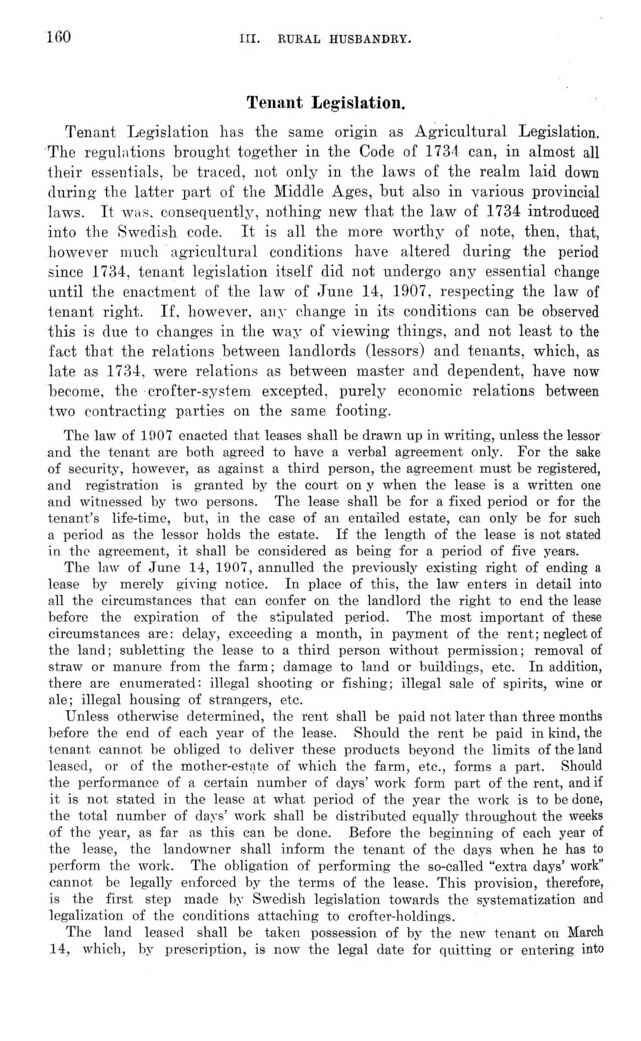
Full resolution (JPEG) - On this page / på denna sida - III. Rural Husbandry. Introd. by H. Juhlin Dannfelt - 5. Agricultural Legislation. By C. Th. af Ekenstam

<< prev. page << föreg. sida << >> nästa sida >> next page >>
Below is the raw OCR text
from the above scanned image.
Do you see an error? Proofread the page now!
Här nedan syns maskintolkade texten från faksimilbilden ovan.
Ser du något fel? Korrekturläs sidan nu!
This page has never been proofread. / Denna sida har aldrig korrekturlästs.
1-2-2
iii. rural husbandry.
Tenant Legislation.
Tenant Legislation has the same origin as Agricultural Legislation.
The regulations brought together in the Code of 1734 can, in almost all
their essentials, be traced, not only in the laws of the realm laid down
during the latter part of the Middle Ages, but also in various provincial
laws. It was, consequently, nothing new that the law of 1734 introduced
into the Swedish code. It is all the more worthy of note, then, that,
however much agricultural conditions have altered during the period
since 1734, tenant legislation itself did not undergo any essential change
until the enactment of the law of .Tune 14, 1907, respecting the law of
tenant right. If, however, any change in its conditions can be observed
this is due to changes in the way of viewing things, and not least to the
fact that the relations between landlords (lessors) and tenants, which, as
låte as 1734, were relations as between master and dependent, have now
become, the crofter-system excepted, purely economic relations between
two contracting parties on the same footing.
The law of 1907 enacted that leases shall be drawn up in writing, unless the lessor
and the tenant are both agreed to have a verbal agreement only. For the sake
of security, however, as against a third person, the agreement must be registered,
and registration is granted by the court on y when the lease is a written one
and witnessed by two persons. The lease shall be for a fixed period or for the
tenant’s life-time, but, in the case of an entailed estate, can only be for such
a period as the lessor holds the estate. If the length of the lease is not stated
in the agreement, it shall be considered as being for a period of five years.
The law of June 14, 1907, annulled the previously existing right of ending a
lease by merely giving notice. In place of this, the law enters in detail into
all the circumstances that can confer on the landlord the right to end the lease
before the expiration of the stipulated period. The most important of these
circumstances are: delay, exceeding a month, in payment of the rent; neglect of
the land; subletting the lease to a third person without permission; removal of
straw or manure from the farm; damage to land or buildings, etc. In addition,
there are enumerated: illegal shooting or fishing; illegal sale of spirits, wine or
ale; illegal housing of strangers, etc.
Unless otherwise determined, the rent shall be paid not later than three months
before the end of each year of the lease. Should the rent be paid in kind, the
tenant cannot be obliged to deliver these products beyond the limits of the land
leased, or of the mother-estate of which the farm, etc., forms a part, Should
the performance of a certain number of days’ work form part of the rent, and if
it is not stated in the lease at what period of the year the work is to be done,
the total number of days’ work shall be distributed equally throughout the weeks
of the year, as far as this can be done. Before the beginning of each year of
the lease, the landowner shall inform the tenant of the days when he has to
perform the work. The obligation of performing the so-called "extra days’ work"
cannot be legally enforced by the terms of the lease. This provision, therefore,
is the first step made by Swedish legislation towards the systematization and
legalization of the conditions attaching to crofter-holdings.
The land leased shall be taken possession of by the new tenant on March
14, which, by prescription, is now the legal date for quitting or entering into
<< prev. page << föreg. sida << >> nästa sida >> next page >>